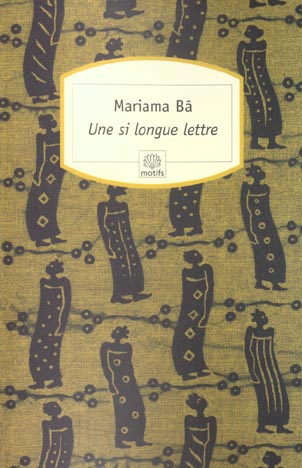

Developed from the scholarship of African American Kimberle Crenshaw on intersectionality-to highlight how overlapping social identities relate to systems and structures of oppression, and discrimination-intersectional feminism examines imbricated structures of discriminations to which women are subjects, due to their ethnicity, sexuality or economic condition.

Its main objective is to demonstrate that the Senegalese writer, by representing women at the intersection of multilayered and interlocking systemic oppressions, is an early intersectional feminist.

This article looks into Mariama Ba's seminal novel, So Long a Letter, through the lens of intersectional feminism. This paper suggests that women should join hands and use the power available to them if they are to overcome the challenges they all face. 1 It focuses on :female-female' relations mediated by age, generation, education, exposure, and experience, in order to understand the complexities of patriarchal oppression and to contribute to the debate on the nature of patriarchy and its role in the oppression of women in African societies. which generally emphasizes 'male-female' relations of oppression as an ideal way of understanding male dominance and female subordination. Thus, this study differs from conventional feminist research.

The focus is on elderly women who, often times, are so ignorant, self ish and manipulative that they make life hard for other women. However, a close reading of texts by some African women writers like Mariama Bd, provides a critique of this standpoint, and examines the direct and indirect roles played by some women in the sustenance and perpetuation of patriarchal oppression. Mainstream feminist scholarship allributes the dominance of patriarchal ideology in African society to the activities of men, while regarding women as innocent victims of patriarchal authority.


 0 kommentar(er)
0 kommentar(er)
